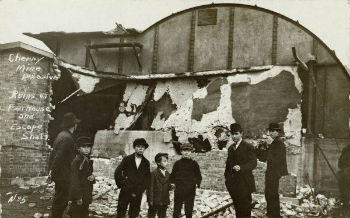The following guest column by Senator Don Harmon was published in The (Springfield) State Journal-Register on Sunday, Nov. 27, 2016.
As wealthy politicians clamor to cut benefits for workers who are injured and killed on the job, it's a fitting time to remember a mine accident a century ago that was so tragic it moved lawmakers to make Illinois a national leader on workers' compensation and workplace safety.
In 1909, the Cherry Mine in Bureau County employed 550 men and produced 1,500 tons of coal daily to fuel locomotives. Immigrant families flocked to Cherry for steady employment in what was considered one of the safest mines in the nation.
 During a Saturday shift on Nov. 13 that year, a kerosene torch dripped oil on a cart filled with hay. It smoldered unnoticed until a blaze erupted, trapping many of the workers in the bowels of the mine. In the end, 259 people died, leaving behind 500 fatherless children and 160 widows.
During a Saturday shift on Nov. 13 that year, a kerosene torch dripped oil on a cart filled with hay. It smoldered unnoticed until a blaze erupted, trapping many of the workers in the bowels of the mine. In the end, 259 people died, leaving behind 500 fatherless children and 160 widows.
Donations poured in for the victims' grief-stricken families, and a settlement was reached with the railroad company. Each family received $1,800 for the loss of life and income.
Human error and problems with the mine's design contributed to the death toll. It remains one of the worst mining accidents in U.S. history.
Stunned lawmakers quickly acted to ensure better oversight of the industry, improve safety standards and establish a formal workers' compensation system, making Illinois a national leader. In 1911 it became the third state to establish a workers' compensation system; Maryland passed a law in 1902, and Wisconsin passed one earlier in 1911.
A state historical marker at the site today tells the tragic tale and notes Illinois' progressive response.
We should be proud of our record of supporting injured workers. Instead, wealthy politicians and corporate executives tell us the costs associated with workers' compensation are too high and thwart economic growth — even though we made significant changes to the system in 2011, saving employers hundreds of millions of dollars.
I am open to discussing further changes and learning more about the challenges companies face. We need them to invest in our state and its workforce.
But it infuriated me when I read a letter ("Illinois must reform workers' comp") in the Oct. 7 edition of The State Journal-Register by an Illinois Manufacturers' Association executive asking, "Is it fair that Illinois businesses pay $470,000 for an arm injury when the national average is only $170,000?"
Is it fair? I guess it depends on how much your arm is worth to you. What price do you place on playing catch with your kids or hugging your grandchildren? Are you willing to lose your house and life savings to pay the bills that stack up after your arm is mangled in a machine at work?
Workers need assurances, too. No-fault workers' compensation systems were established largely with the blessing of corporations that faced unlimited liability when sympathetic jurors were confronted with disfigured workers or grieving widows who had no choice but to sue in civil court. In exchange, states limited the liabilities companies face for workplace injuries and illnesses.
Now Gov. Bruce Rauner wants workers to give up more, even as federal officials have threatened intervention because states continue to scale back this important safety net at an alarming pace.
Further changes to workers' compensation in Illinois must strike a compassionate balance between the needs of injured workers and those of the companies we rely on for a vibrant economy. We should never forget how far we've come.
— State Sen. Don Harmon, D-Oak Park, is president pro tempore of the Illinois Senate.




